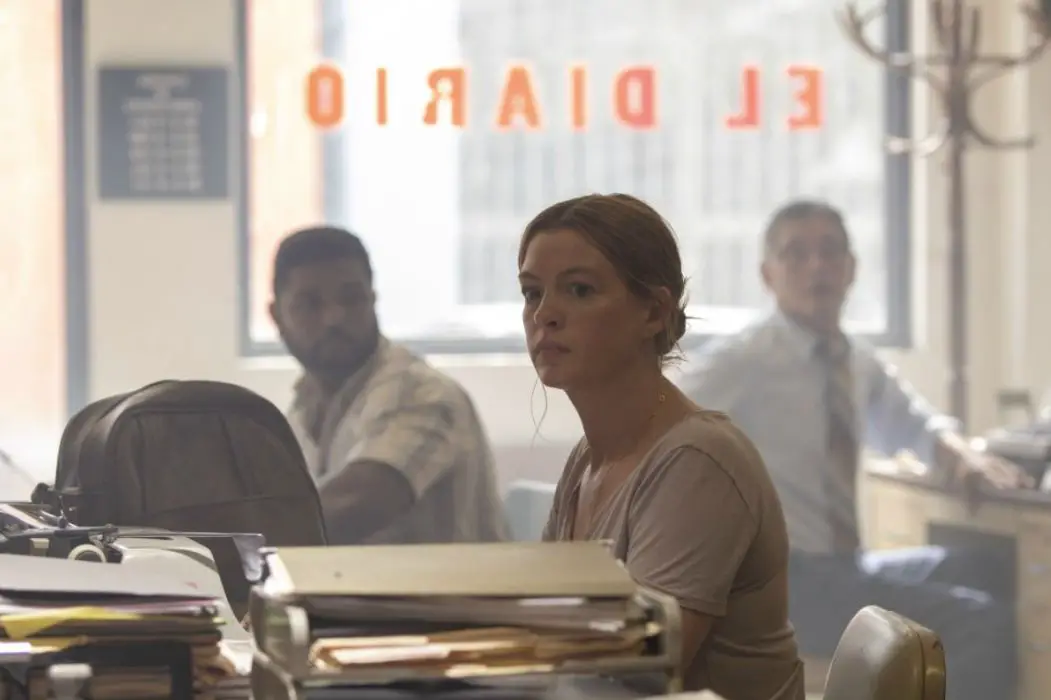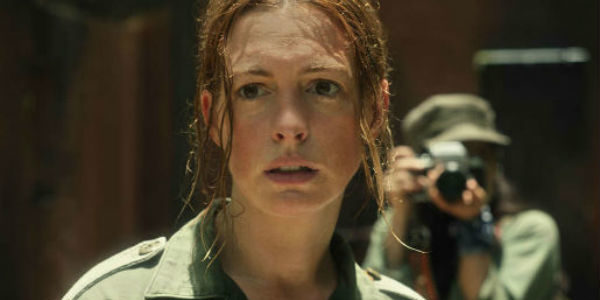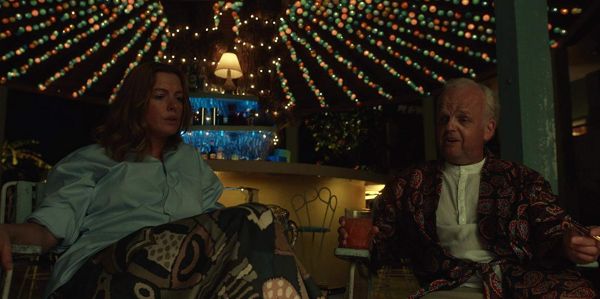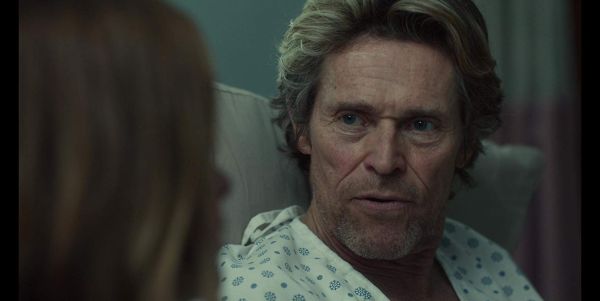THE LAST THING HE WANTED: Making Sense Of Netflix’s Confounding Thriller

Confusion is the feeling that comes to mind when describing The Last Thing He Wanted, one of the more bewildering American movies in the last couple of years. You’re never quite sure where the wheels fall came off, only that at every moment you’re questioning where, why, and how anything is happening in its convoluted mess of a screenplay.
Getting Lost in a Mess of a Movie
About the only one who seems to have any understanding is Anne Hathaway, playing Elena McMahon, the determined D.C. journalist at the center of this misguided thriller. Hathaway’s always managed to be a fully committed and ferocious actor, approaching every roll with a level of confidence and assurance. Watching her, you see someone who knows the characters she inhabits inside and out.
At every step, Hathaway understands the emotions, personal history, and ideology of her character. However, by a certain point, you begin to feel as though Hathaway is no longer a safety net to hold on to for emotional stakes. As the movie progress, her performance feels as though it is hiding something from us, as though she as an actress understands fully what the material is trying to say and what her character’s motivations are, while we as audience members are left totally in the dark.

Hathaway is at least lucky, as she seems engaged in the material even if we are not. However, the rest of the cast feels either just as lost as us or stranded in a completely different movie. Among the collage of characters is a Wayne Diamond looking Willem Dafoe, playing Elena’s gun-running father who has dementia. Their scenes together feel stripped from another movie entirely as their performances push and pull in clashing tones.
At times that dynamic makes sense with if you take into account the dementia, but even THAT is something I had to research to be sure. In truth, the core of what doesn’t make sense is the relationship in general. How often are they in each other’s life and why does Elena feel so inclined to take care of him?
But, Dafoe still fares better than Rosie Perez, stuck in a role that offers nothing but answering late-night telephone calls as a fellow reporter to Hathaway‘s character. At least Ben Affleck has an aura of self-awareness around him, going through every scene with a bewildered look to indicate he’s as confused about who he is playing and the movie around him as we are. For clarification, I’m not going to bother describing his character because what is he? A senator? A CIA operative? A gun-runner?
What Does This Mean for Dee Rees?
Ultimately, The Last Thing He Wanted will wind up a minor blip on the resume of most of these actors. They’ve done great work before and will survive, with my hunch that almost no one will seek out this movie. However, as the movie ended, I couldn’t help but worry about the film’s director, Dee Rees.
It’s sporadic we get something that is a genuine, honest to god disasters; a film like The Last Thing He Wanted in which next to nothing works. Most of the time, they’re a fascinating text for something gone awry. We watch them with our draw on the floor as if out of disbelief and wonder if at any moment someone stopped to say, “We’ve made a huge mistake.”
These kinds of movies happen to even the best artists, Francis Ford Copolla made both The Godfather and Jack. But, there’s a wave of fear that comes-over seeing such a picture from a female filmmaker. Though progress is being made on allowing women the voice and budget to tell stories on screen, there still exists an absurd double standard.

A male director can historically release an utter disaster and still survive to work again. Everyone loves a comeback narrative, no? But, for female directors, a perceived failure can often mean exclusion, as if its existence confirms some sexist bias in a traditionally male-dominated industry. Filmmakers like Karyn Kusama and Lynne Ramsay have found themselves in a kind of director jail after creative failures, often struggling to find financing for new projects for years to come.
It’s of little surprise why many of our most talented female filmmakers wind up drifting toward television work. But, is that the future we want for Dee Rees? Having not seen her much-celebrated first feature, Pariah, my only experience with her work is her 2017 feature Mudbound. While not finding myself in the camp who viewed the picture as an underrated masterpiece, robbed of any substantial nominations at the next year’s Oscars, there was a texture and sense of place present on-screen that demonstrated an artist capable of growing into larger stories.
And even in The Last Thing He Wanted, there are flashes of technical flair, such as sweeping camera movements through newspaper offices or the way characters on phone calls are connected by tracking shots through walls. Some have hailed Rees as one of the key breakthrough directors of the last decade, and it would be a shame to let one misfire trample the career of an artist still evolving on screen.
When Plot Eclipses Story
The Last Thing He Wanted is not “confusing” in the way, say, a David Lynch movie can sometimes be for viewers. This isn’t the kind of picture that acts as a cinematic Rorschach test that frees the audience to apply their theories and interpretations to the material. Here, it’s the weight of the material and the endless jungle of shifting subplots, characters, and pieces of information that disorient the audience. Adapted from a Joan Didion novel of the same name, The Last Thing He Wanted feels like an adaptation so slavishly devoted to the source material that it merely tries to cram everything into a tightly packed 2-hour package. But ultimately, the desire to treat every moment from a book with the utmost preciousness does quite the opposite.
Movies require a driving force and become hindered by various digressions that a novel can often indulge in. As a result, a film like The Last Thing He Wanted becomes focused on plot rather than the story. You can feel a bullet-list of characters and dangling threads being served without any consideration as to the motivation of those characters or how various moments and clues connect to a larger story at hand.

Plot, as one comes to understand it, is nothing more than raw information. It’s not what drives characters to make the choices they do or propel the picture forward. With its interchanging chessboard of arms dealers, government bureaucrats, and international spies, you could almost imagine a version of The Last Thing He Wanted that bucks back on its web of conspiracy. Movies like The Big Sleep, The Long Goodbye, or even Inherent Vice embrace a certain shagginess, understanding that their swirling narrative jungle is ultimately too convoluted to understand.
Those pictures accept the notion that no one without a whiteboard, and an annoying habit of pausing to collect information, would dare try to understand the labyrinth of information they’ve concocted. The conspiracies at their center often represent a broader idea or theme. For Inherent Vice, the mystery is an embodiment of the swirling air of suspension during the early 70s, not to mention a cultural shift from hippie counter-culture to a more conservative obsession with law and order.
The Last Thing He Wanted could have used its tale of a crusading journalist infiltrating the world gun-running as a commentary on the Reagan administration’s funding of contra groups in South America. Still, any real attempt to engage in those political ideas becomes trapped under the movie’s dead weight.
The Last Thing He Wanted: In Conclusion
Despite an all-star cast of respectable and often captivating actors, The Last Thing He Wanted ultimately falls apart due to its convoluted storytelling and slavish devotion to its source material. It’s a bump in the career of writer/director Dee Rees, who, despite showcasing some impressive technical flair, fails to create an engaging story with compelling characters by letting the mechanics and detail of plot get in the way of a driving story with clear ideas.
Do you agree? What are some other films you feel focus too much on plot and not enough on story?
The Last Thing He Wanted is Now Streaming on Netflix.
Does content like this matter to you?
Become a Member and support film journalism. Unlock access to all of Film Inquiry`s great articles. Join a community of like-minded readers who are passionate about cinema - get access to our private members Network, give back to independent filmmakers, and more.













